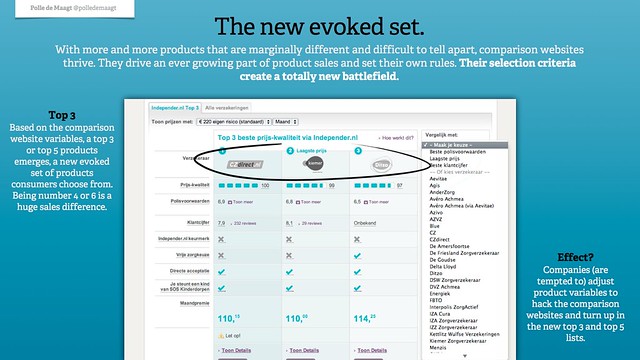More products. More services. More sites. And it’s ever more difficult for consumers to tell them apart. Hence, the rise of search engines, comparison websites and review sites. They drive an ever growing part of product sales and set their own rules. Their selection criteria create a totally new battlefield.
It’s the top-3-fication of brands. And it’s their own fault. Most communication and advertising makes things cloudier instead of clearer. Most products are marginally different. Most brands don’t add real value in acts, but add the difference in ads. Consumers seek clarity and help in making the right decisions. In travel, in insurance, in books, in digital gear and maybe sooner or later, in food and other categories. Comparison websites and (niche) search engines help to bring this clarity and transparency.
Based on these comparison website variables, a top 3 or top 5 products emerges, a new evoked set of products consumers choose from. Being number 4 (when there’s a top 3) or 6 (when there’s a top 5) is a huge sales difference.
The effect? Companies (are tempted to) adjust product variables to “hack” the comparison websites and turn up in the new top 3 and top 5 lists.
But I really hope, this will trigger brands to rethink their positioning. To be truly different. To add so much value for consumers that they aren’t reduced to a column in an excel doc. To be conversation worthy on every brand level. To redefine themselves with a purpose and a social brand voice, like Dogma, like Skittles and like Bagels & Beans.
Let’s stop the top-3-fication of brands. Let’s start adding real value.
